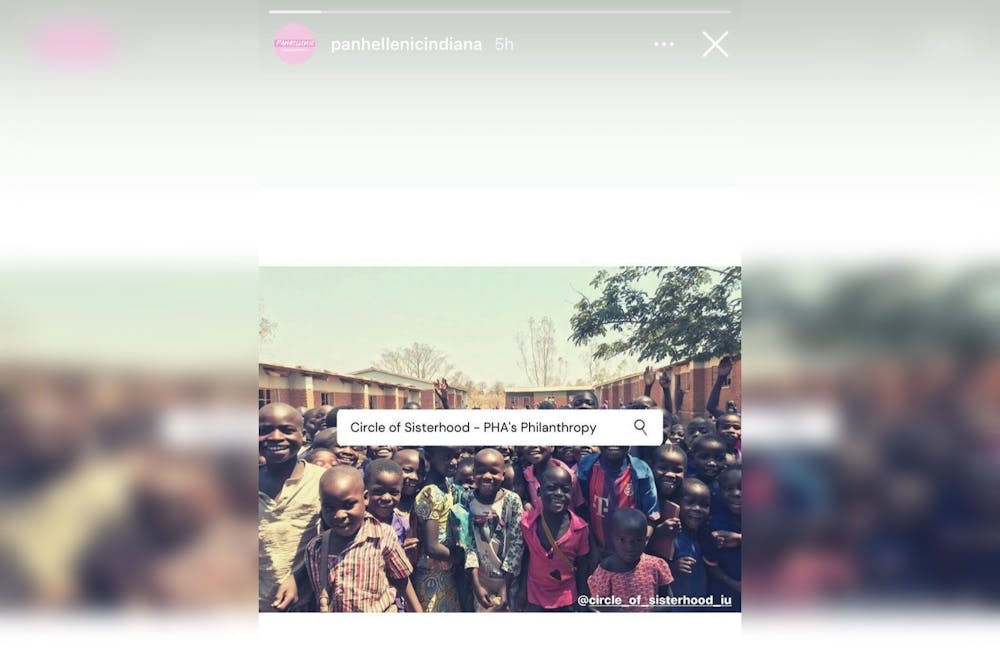The Panhellenic Association at IU blocked one of its members on Instagram Jan. 30 after the member direct messaged the account commenting on a post she said she thought displayed white saviorism.
The association is involved in philanthropy through Circle of Sisterhood, which raises money from the different chapters of PHA to go on mission trips. Circle of Sisterhood helped build a school in a village in Malawi, Africa, and posted a picture of some of the students who will be attending the school.
White saviorism, also known as the white savior complex, is a term that describes white people providing support to non-white communities, often in Africa. This help is often viewed as self-serving.
Junior Lauren Hallonquist, a sorority member at IU, reached out to the association after seeing the post on its Instagram story. She said she told them she is part of PHA and did not feel like the post represented the group’s ethos.
She said she asked to speak to someone else because the person operating the account was not open for a conversation.
In a DM to the account, Hallonquist said the photo depicted white saviorism and was poor taste. She said she would explain more on the topic, if someone was willing to learn.
The Panhellenic Instagram account responded disagreeing with her statement, saying “it isn't white saviorism. It is reflective of the people’s whose lives are being impacted by circle of sisterhood and the picture was taken directly from indiana university’s circle of sisterhood page.”
Hallonquist responded saying capitalizing on poverty to promote PHA is wrong.
She was later blocked, then unfollowed, by the IU Panhellenic Instagram account. She said she has since been unblocked.
Hallonquist told the Indiana Daily Student she believes mission trips where people go to poor areas and take a lot of pictures documenting the people who live there is exploitation.
“As a member of Panhellenic, I felt a deep sense that this wasn't right and this should not be happening,” Hallonquist said. “I believe that Panhellenic can be an amazing place based on my experience.”
Neither the Panhellenic Association at IU nor the National Panhellenic Conference responded to the Indiana Daily Student’s requests for comment on the situation.
“When we are talking about international communities, we have to be careful to not make it look like it’s our job to save them,” Hallonquist said.
[Related: Black Voices: What about Black greeks?]
The former IU Panhellenic diversity and inclusion vice president, made a Twitter thread elaborating on the Circle of Sisterhood issues. She declined to comment for this story.
“Panhellenic has a major problem with tokenizing and tone-deaf posting on Instagram. If you look at their feed it is very clear!! Posting people when it is convenient or fits your agenda is tokenizing,” she wrote in the Twitter thread.
She wrote that the PHA social media accounts are not always responsive.
“Many people have tried to DM or talk about the posts or stories but get left on read or blocked. (see later tweets below) There is no discussion or acknowledgement of people’s thoughts or forwarding of comments to VPs,” she wrote on Twitter.
Halloquinist said the president of IU’s Panhellenic Association reached out to her a day after she made her post and they had a conversation to address her concerns Feb. 3.
Audria Liggins, another former member of IU Panhellenic, said this has not been the first time people have spoken about the Circle of Sisterhood and its relationship to white saviorism.
“They usually frame it in the same way, helping kids in Africa,” Liggins said. “I know that missionary trips aren’t always helpful because they don’t actually solve the real issues like making the economy grow.”
IU freshman, Ethan Kawamara Mugire, is from Uganda. He said he was not pleased after seeing the Circle of Sisterhood post. He said he did not know people who go to poverty-stricken places in Africa in the name of helping publicize poverty to improve their self-image.
He said the images of Africa just contribute to the stereotype that all people in Africa are hungry and suffering.
“Although the kids in the picture were happy, that picture was negative because the kind of environment those kids were in was not the best,” he said. “Publicizing that image just feeds into the stereotypes about Africa.”




